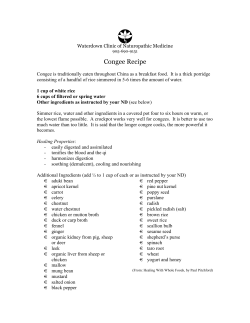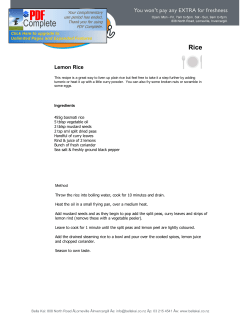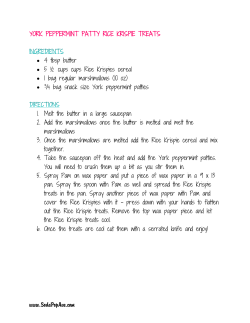
Document 177092
How to Comply with EPA Regulations for Stationary Reciprocating Internal Combustion Engines (“RICE”) Roy Crystal, EPA Region 1 (New England) 1 Overview • How RICE & RICE Emission Controls Work • Common RICE Uses • Compliance Requirements & Challenges • Case Study – NH Asphalt/aggregate Plant • Resources to Help you Comply • Effective Compliance Strategies 2 What is a Reciprocating Internal Combustion Engine (“RICE”)? • Reciprocating engine (aka piston engine) - heat engine that uses reciprocating pistons (which alternatively move back and forth ) to convert pressure into rotating motion – several types, including internal combustion • Internal combustion engine - combustion of a fuel with an oxidizer (air) occurs in a combustion chamber • Expansion of high temp. & pressure gases applies force to piston or turbine blade – generating mechanical energy • Fuel ignited by spark (“spark ignition”, gasoline) or by heat of compression (“compression ignition” or “diesel”, diesel fuel) 3 Four Stroke Spark Ignition Engine Source: Rkm.com.au 4 Compression Ignition Engine Source: Flightlearnings.com 5 Oxidation Catalyst Source: http://www.omnitekcorp.com/catsdocdpf.htm 6 Closed Crankcase Ventilation System Source: https://sites.google.com/a/swedishmotors.com/swedish-motorsinc/home/service-and-parts-information/articles/pcv-system 7 RICE Are Used to… • move a vehicle (not a stationary source, so not regulated by air toxics program) • generate electric power – for sale, onsite use, emergency backup (including combined heat and power uses) • generate electric power onsite to run another machine • power a compressor – by direct mechanical energy • power a pump – by direct mechanical energy 8 What Sectors in NE have RICE Engines? • • • • • • • • • • • • Looked at 98 Region 1 RICE notifiers by NAICS Codes – 71 known NAICS 221 – Utilities (16) NAICS 444 – Building & Garden Equipment & Supplies Dealers (6) NAICS 423 – Merchant Wholesalers, Durable Goods (5) NAICS 622 – Hospitals (4) NAICS 611 – Educational Services (4) NAICS 313 – Textile Mills (3) NAICS 237 – Heavy & Civil Engineering Construction (3) NAICS 238 – Specialty Trade Contractors (3) NAICS 327 – Nonmetallic Mineral Product Manufacturing (3) NAICS 336 – Transportation Equipment Manufacturing (3) NAICS 928 – National Security & International Affairs (3) 9 What Other Sectors in NE Probably have RICE? • • • • • • • NAICS 48621 – Natural gas transmission NAICS 713920 – Skiing facilities (snowmaking) NAICS 323 - Printing NAICS 21231 – Stone Mining & Quarrying NAICS 421930 – Recyclable material NAICS 711310 (sports arenas) & 713940 (ice skating rinks) Potentially anywhere producing electric power for onsite use, or running a pump or compressor 10 RICE Powering Crusher at Sand & Gravel Plant Source: New Hampshire Dept. of Environmental Services 11 Compliance Requirements & Challenges • Initial notification required. Reporting dates have passed – August 31, 2010 (CI) & February 16, 2011 (SI) • Only about 100 notifications received in the region – who is missing? • Limited assistance to date by EPA headquarters & states • Some good resources available • Several industrial/commercial sectors use RICE engines – how to reach them all? • Compliance dates for existing engines: May 2013 (CI) and October 2013 (SI) - we have some time • Requirements complex – opportunities to clarify • Coordination with existing state requirements • Some sources will find compliance difficult 12 Compliance Requirements & Challenges – contd. • Need to clarify - “what is an emergency engine?” • Demand response use of engines encouraged – only Independent System Operator (ISO) knows • Use engine too much (time limits) – sources may become subject to RICE NESHAP nonemergency engine requirements! 13 Where to Send Notifications, Reports, Performance Test Protocols Sources in New England send to*: US Environmental Protection Agency Region 1 5 Post Office Square, Suite 100 Mail code: OES04-2 Boston, MA 02109-3912 Attention: Air Clerk *Also send notifications & reports for all sources to New Hampshire; in all other New England states, send state only reports for sources with Title V operating permits. 14 Preparing for a Performance Test • Submit Notification of Performance Test at least 60 days in advance of test date • EPA Region 1 requires test protocol for all performance tests (submit with notification); may observe test • Contacts for questions at EPA Region 1 lab : William Osbahr – 617-918-8389, Osbahr.William@epa.gov; Michael Looney, 617-9188665, Looney.Mike@epa.gov • EPA Guidance Documents 042 and 043 for Test Protocols and Test Reports - http://www.epa.gov/ttn/emc/guidlnd.html 15 RICE NESHAP Requirements for Operating Emergency Engines • 100 hour limit for maintenance checks & readiness testing • 50 hours per year allowed for non-emergency uses, counted toward 100 hour total limit • 15 hours per year permitted as part of demand response program, counted as part of 50 hour non-emergency use (proposed settlement to increase 15 hours to 60 hours) • Existing residential, commercial, institutional emergency RICE are not covered by rule but must meet above 3 provisions to be considered emergency 16 RICE NESHAP - Issues with Operating Emergency Engines • Owners of all affected emergency RICE need to install non-resettable hour meters & record hours of operation • Bottom line – now you have to track & manage your engine use to avoid exceeding usage limits under the definition of emergency • If you run your engine in excess of allowable nonemergency hours/year – you have to comply with RICE NESHAP requirements for non-emergency engines 17 When May Sources Find it Costly or Difficult to Comply? • Scenario 1 – a stone mining & crushing facility far from the grid that uses large RICE engine to run crusher & may operate only seasonally – high cost to retrofit and test • Scenario 2 – a small facility with a large, older diesel engine – if manufacturer can’t supply an oxidation catalyst or do so at manageable cost • Scenario 3 – Sources that want to use engines for infrequent nonemergency use that have not set aside funds to retrofit (municipalities?) 18 Possible Cost of RICE Compliance • Performance testing – $1,000 & up? • Non-resettable hour meters – $25-35 • Diesel oxidation catalyst capital cost for a 500 hp diesel engine – $27.4 x horsepower - $939, approx. $13,000 (EPA estimate) • Diesel oxidation catalyst annual operating cost for a 500 hp diesel engine - $4.99 x horsepower + $480, approx. $3,000 • Oxidation catalyst capital cost for 500 hp four stroke lean burn spark ignition engine -$12.8 x horsepower + $3,069, approx. $10,000 • Closed or open crankcase ventilation system - $650-1,000 • Quotes may vary substantially for differing technologies • New engines are expensive but may be more efficient 19 Case Study of NH Aggregate/Asphalt Plant – Simplified Process Flow Blast Rock Crush Rock (5 700 HP diesel generators) Aggregate Product - trucked offsite Ready Mix Asphalt Plant – 1,250 HP diesel generator Aggregate & Liquid Asphalt to Batching Plant 20 Case Study – NH Aggregate & Asphalt Plant • Facility operates 3 crushers, asphalt plant w. 6 CI stationary RICE, 250 gal. diesel fuel/day • $125,000 quote to retrofit 1250 HP Caterpillar 3508 CI generator • 700 hp engines may have lower retrofit costs • $7,500/engine for perf. testing, $30,000/site • $500,000 one-time cost to convert to grid • Other technologies may be available 21 Granite Blasting/Removal 22 Rock Crushing 23 RICE CI Generators for Rock Crusher 24 Ready Mix Asphalt Plant 25 Considering Engine Retrofit or Replacement Explore availability of new technologies Get several quotes – they may vary widely Compare efficiency of current & new engines & fuel costs Carefully assess capital and operating cost tradeoffs – use business math techniques like calculating Net Present Value of investment & Rate of Return 26 Tools for Complying with RICE Rules • Powerpoints from this workshop, past webinars • Applicability flowchart • RICE Summary Table of Requirements (good – but hard to print) • Regulation Navigation Tool • Example Forms for Initial Notification & Notification of Compliance Status – EPA Region 1 RICE webpage, Combustion Portal 27 Some Useful Compliance Tools • EPA Region 1 RICE webpage – www.epa.gov/region1/rice “plain language” summary of RICE NESHAP & NSPS, summary tables, sample Initial Notification and Notification of Compliance Status Forms, events, state contacts, links • EPA Technology Transfer Network Air Toxics website RICE page - www.epa.gov/ttn/atw/rice/ricepg/html#IMP -proposed and final rules, docket index, technical information, fact sheets, training materials • EPA Combustion Portal – www.combustionportal.org, source for EPA combustion-related air quality regulations including RICE & Boiler NESHSAP and RICE NSPS; useful “calculator” for CI RICE NESHAP gives actual compliance requirements; detailed summary of RICE NSPS standards 28 Suggested Procedure for RICE NESHAP & NSPS Compliance • • • • • • • Inventory your RICE – type, date of installation, horsepower (HP) Track RICE use – past & present non-emergency, maintenance/testing, demand management hours/yr Determine applicable EPA & state requirements & compliance dates (try EPA R. 1 RICE webpage & Combustion Portal RICE NESHAP Tool – calculator for CI engines) Submit any required initial notifications to EPA – if past due, send in as soon as possible Note thresholds that define emergency engine & stay within them If emergency engine subject to RICE rule, install hour meters Get help understanding compliance requirements – web pages, EPA & state assistance staff, consultants 29 Suggested Procedure for RICE NESHAP & NSPS Compliance - contd. • Consider pollution prevention & energy efficiency as compliance strategies - e.g. reduce RICE use by changing operations, connect to grid, combined heat & power, more efficient new engine • If your RICE have emission limits & may need retrofit, get engineering help from manufacturer, control firms, consultants • Explore help w. energy efficiency assessment & $ for efficiency improvements from utility industrial energy conservation programs • If performance test required, locate qualified firm, send in Notification of Performance Test, complete test; allow extra time! • Submit NESHAP Notification of Compliance Status to EPA – 2013 compliance date for existing CI & SI engines 30 Need More Help or Info? Roy Crystal, Region 1 RICE Assistance Lead Crystal.roy@epa.gov, 617-918-1745 Susan Lancey, Region 1 Air Toxics Coordinator (contact for RICE applicability determinations) Lancey.Susan@epa.gov, 617-918-1656 Other EPA Regions: EPA Regional Air Toxics Coordinators http://www.epa.gov/ttn/atw/area/regional_contacts.pdf 31
© Copyright 2025









